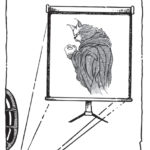“If we do not see our own shadow, we project it onto other people, who then have a fascinating effect on us. We are compelled to think about them all the time; we get disproportionately stirred up about them and may even start to persecute them. This does not mean that certain people whom we hate are not in truth intolerable; but even in such cases we could deal with them in a reasonable manner or avoid them–if they were not the projection of our shadow, which never fails to lead us into every possible exaggeration and fascination.”
–Marie-Louise von Franz, Archetypal Dimensions of the Psyche
Imagine a movie projector. You’d be the projector whirring in that little room at the back, and the other person would be the big screen down in front. You’re CREATING the image, the image is actually coming from you, but the other person is the only place where you can SEE the image. Thus we can hate someone else for having whatever quality of our own we’re projecting, while remaining steadfastly in love with ourselves and not having to change a thing personally. “I don’t have a bad temper. What are you talking about, you asshole? YOU have a TERRIBLE temper!”
“A predominant behavior characteristic of those I would call evil is scapegoating. Because in their hearts they consider themselves above reproach, they must lash out at anyone who does reproach them. They sacrifice others to preserve their image of self-perfection… Since deep down they feel themselves to be faultless, it is inevitable that when they are in conflict with the world they will perceive the conflict as the world’s fault. Since they must deny their own badness, they must perceive others as bad. They project their own evil onto the world. They never think of themselves as evil; on the other hand, they consequently see much evil in others.”
–M. Scott Peck, from “Healing Human Evil,” in Meeting the Shadow
